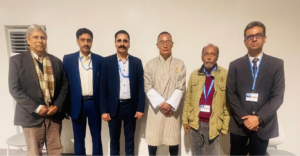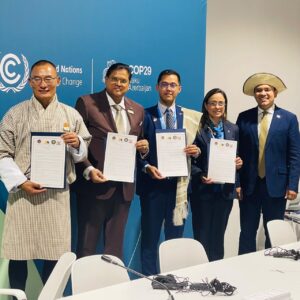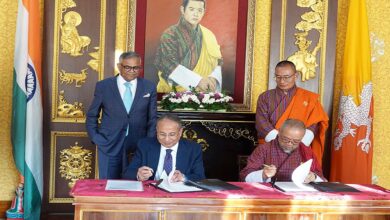Bhutan Leads Formation of ‘G Zero’ Alliance at COP29 to Combat Climate Change
Prime Minister Tshering Tobgay Unveils New Forum of Carbon-Negative Countries, Aims for Global Cooperation on Emission Reduction with Support from SACCJF

By Masum Billah, Baku (Azarbaizan), 13 November
In a significant move to combat climate change, four carbon-negative countries—Bhutan, Madagascar, Panama, and Suriname—have united to form the “G Zero” Forum, a new coalition aimed at advancing global climate protection efforts. The alliance, launched at the COP29 World Climate Conference in Baku, Azerbaijan, seeks to demonstrate that carbon neutrality is not only achievable but necessary for the future of the planet.
Bhutan’s Prime Minister, Tshering Tobgay, joined forces with the leaders of Suriname, Madagascar, and Panama to sign a joint declaration outlining the forum’s goals. Suriname’s President, Chan Santokhi, Madagascar’s Prime Minister, and Panama’s Special Envoy were also signatories of the landmark agreement. This declaration emphasizes the importance of international cooperation to reduce carbon emissions and prevent the devastating impacts of climate change.

During the signing ceremony, the group was joined by members of the South Asian Climate Change Journalist Forum (SACCJF), including its President Asish Gupta, Executive President Karamot Ullah Biplob, and Treasurer Masum Billah. The journalists, who play a crucial role in raising awareness about climate issues, had a private meeting with Prime Minister Tobgay, where the Bhutanese leader outlined the vision behind the “G Zero” Forum.
“The G Zero Forum is not just a symbolic gesture. It is an essential platform to show that carbon neutrality is within our reach, and that it is crucial for the survival of future generations,” said Prime Minister Tobgay. He emphasized that the forum’s ambition extends beyond small, carbon-negative countries. It aims to encourage both developing and developed nations to join the effort to mitigate climate change.
Tobgay also urged the South Asian climate journalists to actively participate in promoting the forum’s message, highlighting the pivotal role the media plays in climate advocacy. In response, SACCJF’s Executive President, Karamot Ullah Biplob, stressed the importance of collective action. He pointed out that a global commitment to carbon reduction, particularly from industrialized nations, is essential to prevent further harm to vulnerable populations, many of whom already face the devastating consequences of climate-induced displacement.
Karamot Ullah Biplob called for stronger accountability from industrialized countries and international trade organizations, urging them to honor their climate commitments beyond mere declarations. “If every nation plays its part, we can protect the lives and property of millions of climate refugees in South Asia and around the world,” Biplob said.
Prime Minister Tobgay also extended an invitation to the journalists to visit Bhutan to discuss the bilateral and global climate challenges in more detail, underscoring the country’s leadership role in climate advocacy.
As the G Zero Forum sets its sights on creating a more sustainable future, it stands as a testament to the power of small nations with ambitious goals to drive international change. The collective efforts of Bhutan, Suriname, Madagascar, and Panama aim to inspire other nations to take decisive action in reducing emissions and mitigating the impacts of climate change, sending a clear message that global cooperation is the only path forward for a livable planet.
The formation of the G Zero Forum at COP29 marks a pivotal moment in the fight against climate change, demonstrating that even the smallest nations can play a leadership role in addressing one of the world’s most urgent crises. The future of climate policy may well depend on whether such coalitions can garner the support of larger, more industrialized nations, making the momentum from COP29 crucial in shaping the global response to the climate emergency.




